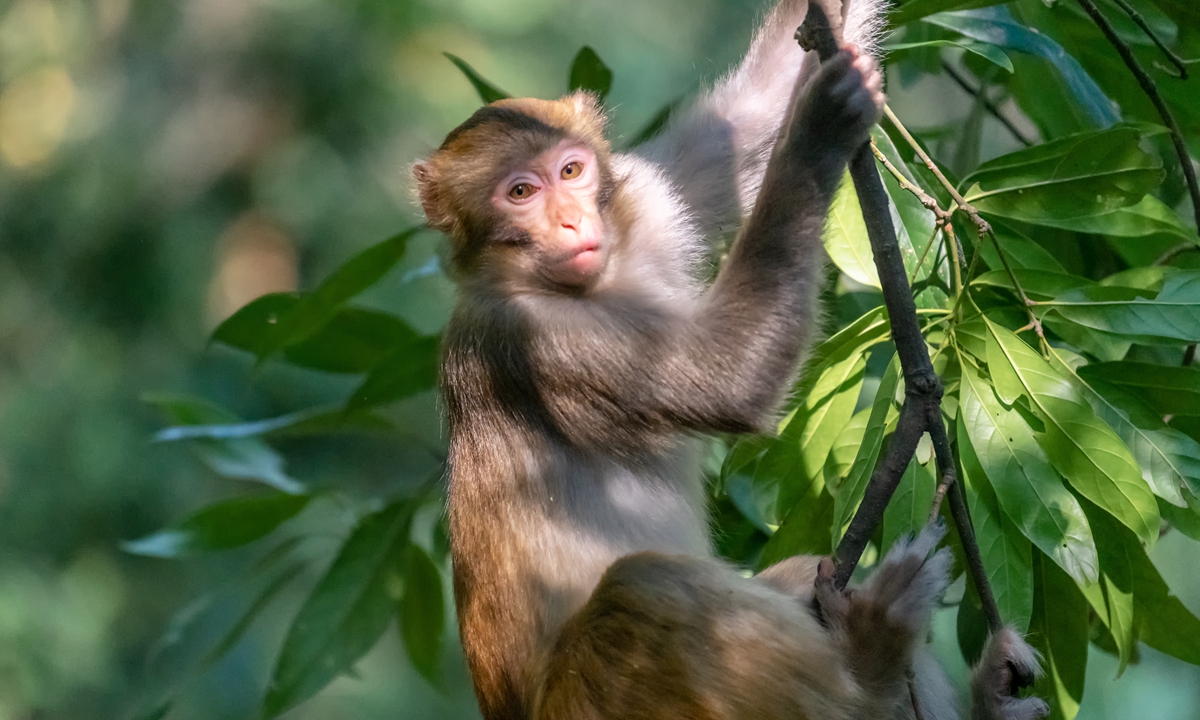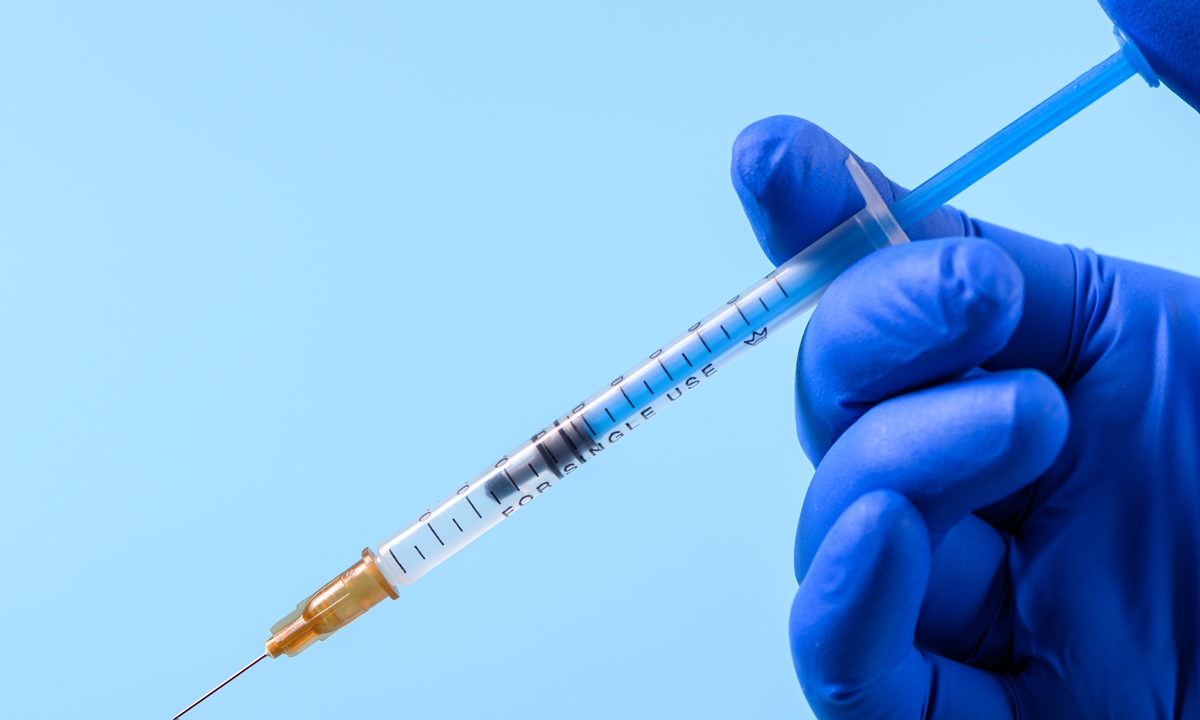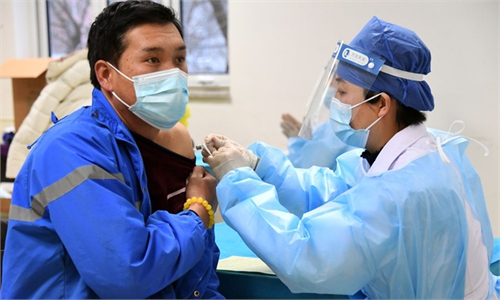Lack of experimental monkeys unlikely to affect development of COVID-19 vaccine: experts
Primate test subject shortage

A monkey climbs a tree in Zhangjiajie, Central China's Hunan Province. Photo: VCG

Photo: VCG
As the COVID-19 pandemic ravages large swathes of the world, global pharma have been racing to develop vaccines since 2020. For ordinary people, the challenges of developing vaccines seem to be a scientific miracle. However, perhaps only few people noticed that the shortage of monkey test subjects became a major bottleneck for many firms throughout the testing of potential vaccine candidates.
"The price of one monkey has soared to 62,000 yuan ($9,541.8) now from 15,000 yuan [years ago] as the supply has been limited for three years," an executive of a biological company told the Global Times in a recent interview.
The cost he was talking about was not related to any animal smuggling cases, but the experimental primates that are used for medical experiment. And Zhang, who asked not to be named, is a chairperson of a biological company based in East China's Jiangsu Province that breeds experimental animals including beagle dogs and marmosets.
Zhang's comments reflected the current status quo of experimental primate supply in China which has witnessed a shortage since 2018 and further saw a tightened shortage in 2020 as many medical companies were racing to develop the COVID-19 vaccines that require a large number of experimental monkeys.
Shortage of supply
According to Zhang Yuchao, the secretary of China Laboratory Primate Breeding and Development Association, there are about 240,000 experimental monkeys bred from two major species in the country, inewsweek.com reported.
Except for juvenile and fertile monkeys, the actual stock of commercial monkeys is about 100,000. If those that are booked or sold overseas are removed, the domestic stock is only about 30, 000, according to the report.
"On the one hand, the needs of experimental monkeys jumped significantly as more medicine researches carried on and also the rush of COVID-19 vaccine developing. On the other hand, supplies withered due to the aging of fertile monkeys that give birth to less newborns," Zhang from the company in Jiangsu said.
The lack of fertile monkeys is partially due to the restrictions Chinese officials put on importing monkeys, Zhang added.
"Since China reformed its medical product administration in 2015, which eased the approval process of generic drugs, the number of registered drugs has been dramatically increased, this also increased the use of experimental primates for safety test," Lü Mengtao, operations director of Beijing Zhimed Medical Science, told the Global Times on Tuesday.
According to the inewsweek.com report, the number of applications for evaluation of new drug clinical trials completed by the Chinese National Medical Products Administration increased from 494 in 2014 to 983 in 2019.
As a result, the number of used experimental primates increased to nearly 30,000 per year in 2019 from about 8,000 in 2013. And since 2017, the number has increased by more than 10,000 each year, according to the report.
"Experimental primate is the species that is closest to performing direct human trials, and in many high-end medical developing programs such as the development of vaccines, monkeys are the only species that could be used to assess the safety," said Lü.
However, while the demand has been dramatically increasing, the supply side has witnessed a decline due to some reasons including the complicated breeding process and the high requirement on experimental primates, experts said.
June Wang, a research fellow from a medical research institution based in Kunming, Southwest China's Yunnan Province, told the Global Times that the requirement for experimental primate is high compared with other animals.
"The age of the monkeys should be between three and five years, with clear genetic backgrounds. And they must pass the quarantine before putting into medical tests," Wang said.
In addition, Lü said that the long breeding process, which normally takes five to eight years is also a reason that slows down the supply of monkeys.
Lü said that the shortage of monkey supply just came to public sight since the outbreak of the COVID-19 pandemic that forced many companies to race to develop vaccines, but it has existed for years.
Impact on vaccine development
Chinese drug authority's ban on the import of experimental primates due to bio-safety concerns has limited the supply, Lü said, adding that since 2013, China tightened the control on the import of experimental primates until 2018, which resulted the low birth rate of monkeys.
"Even though China eased the restriction in 2018, the pandemic in 2020 caused the restriction again," Lü said.
According to Zhang Yuzhao, China Laboratory Primate Breeding and Development Association coordinated 3,551 experimental primates specially for the researches on the COVID-19 vaccines in China.
"The trade of experimental primates has been prohibited in China during the pandemic, any trade must obtain the permission from the Ministry of Science and Technology to prove the trade is related to vaccines development," Zhang was quoted by inewsweek.com.
Lü said animal test is the earlier phase of a vaccine development period before clinical test phase. And as there are already several vaccines successfully launched, the shortage of supply is unlikely to have major impact on China's vaccination effort.
"But as it [the shortage] is expected to last at least for several years, it will have impact on those companies who want to develop new vaccines," Lü said.

